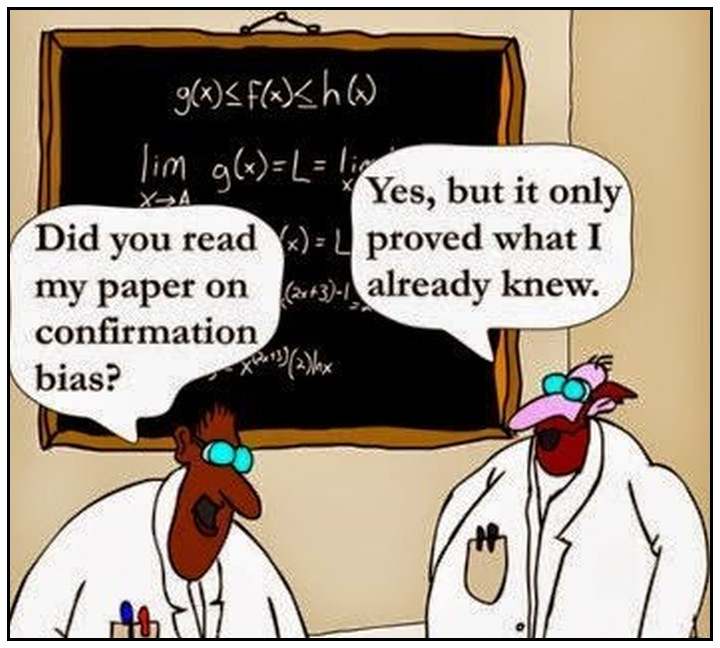THE UNCONSCIOUS CONFIRMATION BIAS PHENOMENON
 As Warren Buffett once stated – "What the human being is best at doing is interpreting all new information so that their prior conclusions remain intact." Most of the time, we are totally unaware of our biases. We are unconsciously interpreting the world around us to make sense of all the bits of signals from our vision, hearing, feeling, tasting, smelling, etc. The way that we make sense of it all is by comparing it to past experiences and knowledge. First impressions are usually the most-lasting impressions. But this often prevents us from really understanding what's happening in the world or what others are trying to communicate to us.
As Warren Buffett once stated – "What the human being is best at doing is interpreting all new information so that their prior conclusions remain intact." Most of the time, we are totally unaware of our biases. We are unconsciously interpreting the world around us to make sense of all the bits of signals from our vision, hearing, feeling, tasting, smelling, etc. The way that we make sense of it all is by comparing it to past experiences and knowledge. First impressions are usually the most-lasting impressions. But this often prevents us from really understanding what's happening in the world or what others are trying to communicate to us.
A good case in point is the news reporting about the war in Ukraine. Various news sources interpret what is happening from their own point of view: I read many articles in Russian written by pro-Russian and pro-Ukraine sources, and they lead the reader to just the opposite conclusions about the same events. If a person has a pro-Ukrainian position, the natural tendency is to block out information from the opposite position, and vice-versa. People have an unconscious bias toward their own family, religion, ethnicity, and nationality: both birds and people tend to flock together with those who are like them. Also, social media algorithms learn our views and desires so they can feed us more posts and ads reflecting our views, thus unconsciously confirming our biases. This is why it's important to study both sides of an issue, so that we can come to well-informed and more accurate conclusions. This same principle applies to political and social issues.
Another example: when an older person has a disability or has just experienced a health issue, others may often interpret that as a permanent condition that indicates mental decline or even soon-approaching death. Then they write off that person as permanently, totally disabled and about to depart this world... so why spend much time with that person? But when the older person's condition improves, the onlooker's prior conclusions remain intact – new information or evidence is ignored: "My mind is made up, don't confuse me with facts!" People often refuse to admit they have an unconscious confirmation bias precisely because they are unaware of it.
How does all of this relate to our spiritual worldview: our beliefs and behavior? Do we automatically dismiss or challenge interpretations of Scripture that don't agree with our existing convictions? Do we argue, or interrupt, or ridicule, before we hear out another person? Are we thinking of how we are going to disprove another's position instead of actually listening to what they're saying? Often is is better to say nothing, to refrain from arguing, than to try convincing someone with facts if their mind is already made up: a good way to lose friends.
In Romans 2:5 and 8 we read – "But according to your hardness and unrepentant heart you are treasuring up for yourself wrath in the day of wrath, revelation, and of the righteous judgment of God... to those who are self-seeking, and don't obey the truth, but obey unrighteousness, will be wrath and indignation." When a person has a pre-set bias toward sin, his heart is hardened and unable to repent and he will suffer the consequences. He may rationalize his beliefs as righteous in order to justify his sinful behavior, but the objective truth does not change, and God Who is the final arbiter of truth will judge rightly. "He who conceals his sins doesn't prosper, but whoever confesses and renounces them finds mercy" (Proverbs 28:13).
It is important to be accountable to mature Christians, especially to those whose teachings have been accepted "always, everywhere, and by all." Heresies develop in isolation when theologians neglect accountability from the broader Christian tradition. To guard against it, we should study theology in the context of a community of believers who will together submit to godly men who "rightly divide the word of truth." So avoid "private interpretation," especially by those who have little or no theological qualification.
The Nicene Creed, which I've written about in some of my recent posts, represents what the historic Church has believed for centuries. It was written and accepted by the Church even before the canon of the New Testament was officially adopted. We tend to rationalize beliefs that we received earlier and want to be true, so we invent a "rational" explanation for them, selecting only the data that confirm our position. Beware of confirmation bias!
Go to ARC-News to read our free e-newsletters and Subscribe!

No comments:
Post a Comment